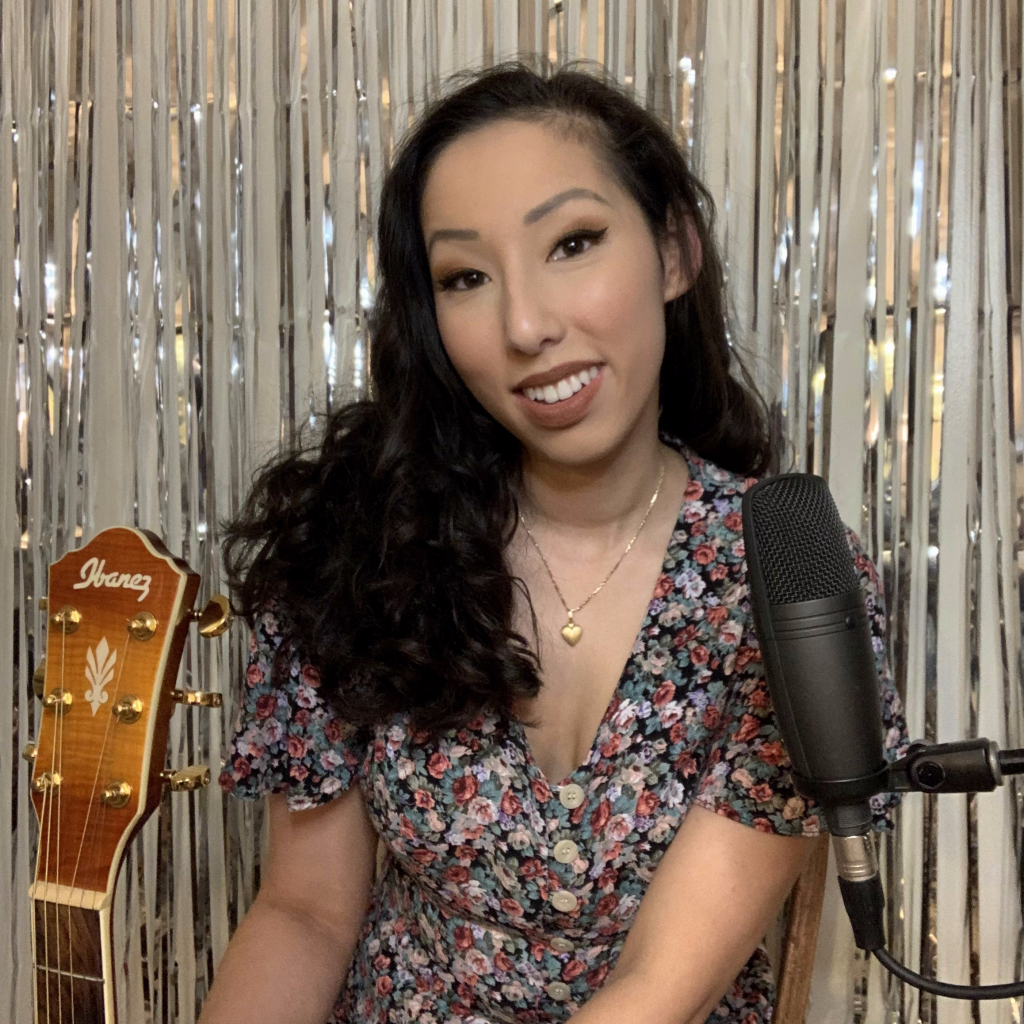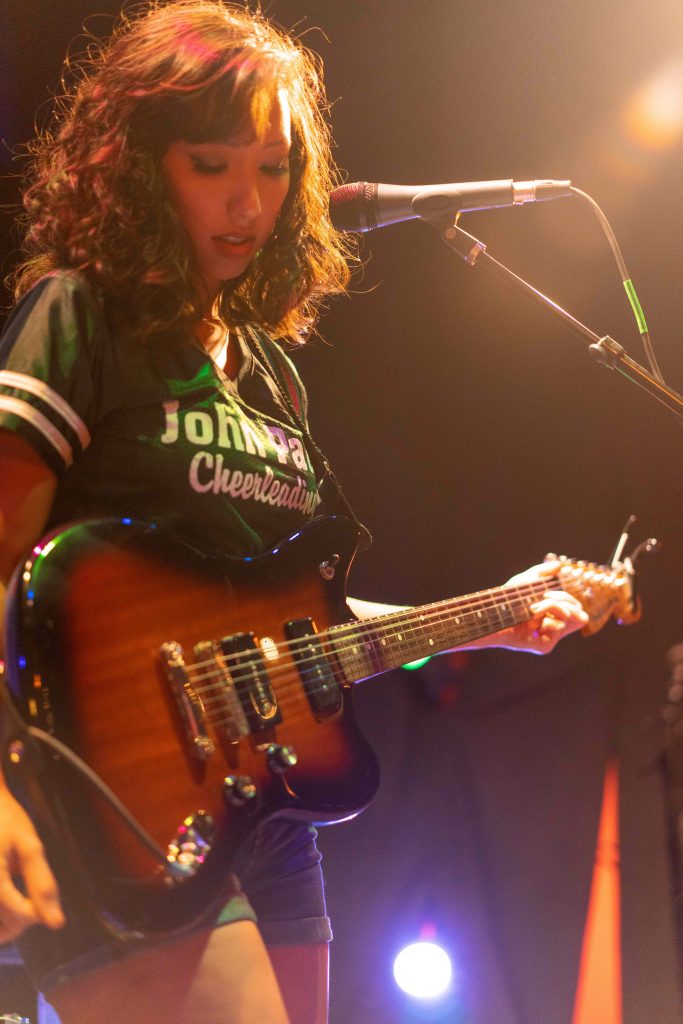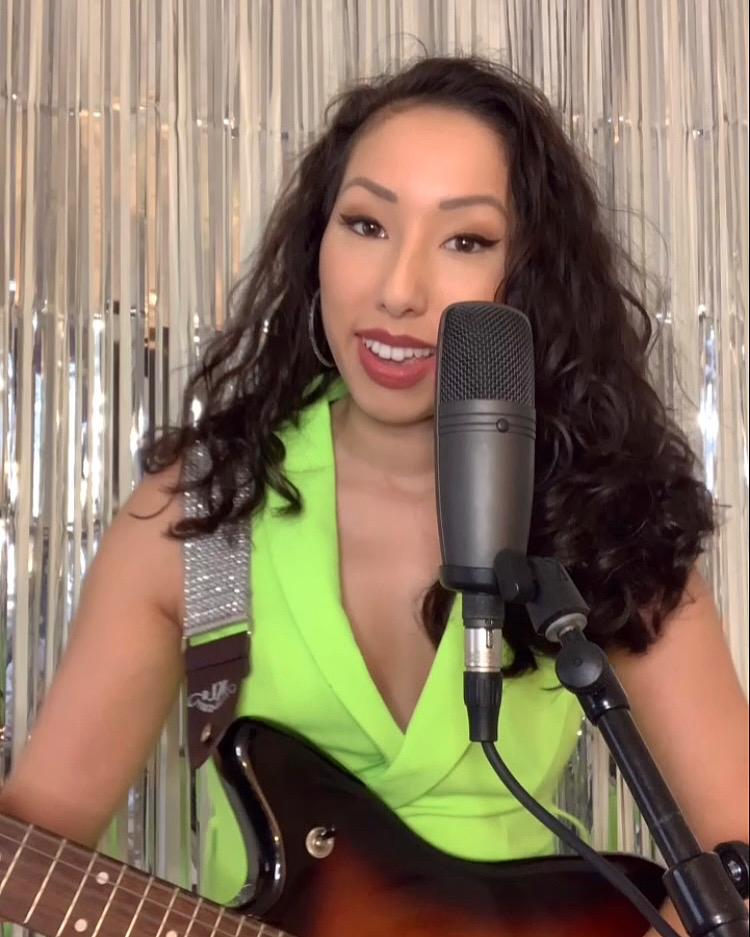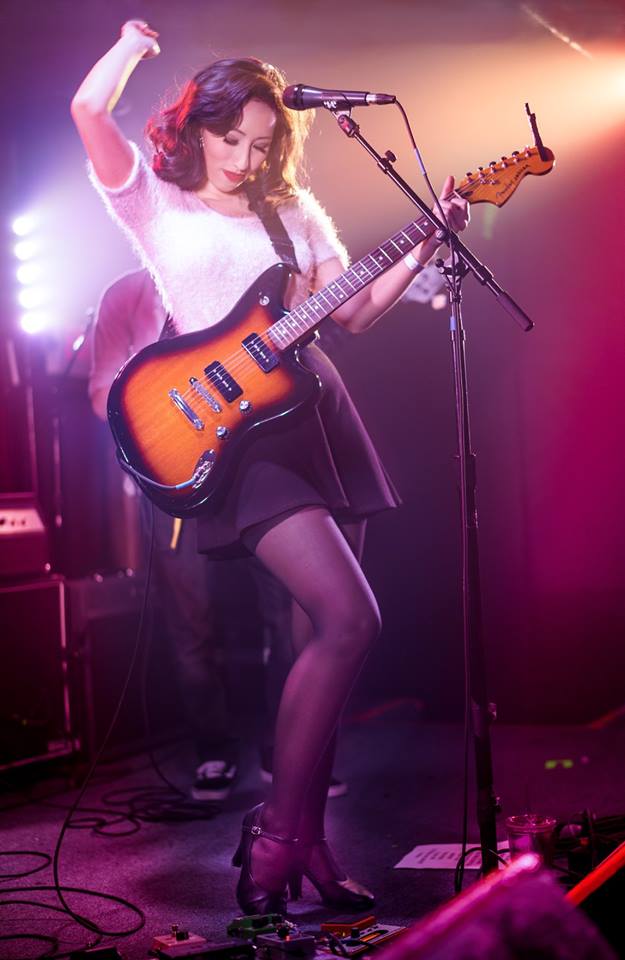“Don’t preemptively say no to yourself. The more times that you’re rejected, you get so much better at it. You become more resilient. Remember: It’s okay to fail. It’s okay to make a mistake. Try everything and see what works best for you.”

Meet Caroline Weinroth:
Indie rock power pop ex-pageant queen.
The talented singer-songwriter fronts indie rock project Cinema Hearts. The band has traveled across the east coast, playing gigs in concert halls and rock clubs. She found a supportive community within her local Washington DC music scene. Besides immersing herself in the power of music on stage, Caroline has explored her creative expression through musical theatre, modeling, and DIY music. She even participated in pageant shows back in the day.
Steadily challenging herself, she strives to learn as much as she possibly can about the ins and outs of the music industry — her impressive resume includes valuable experience as an audio engineer, handling operations at concert venues, and working for a county government arts program; through these events, Caroline was exposed to more genres of music and types of performers. She thoroughly enjoyed the new experiences and opportunities to work festivals, meet local bands, and offer advice to other emerging artists. New Cinema Hearts music lies ahead on the horizon, encompassing a new sonic direction that Caroline has worked hard to achieve — a throwback to old Cinema Hearts, while simultaneously embracing a natural progression that fits the vision she’s had in mind for the band since its origin.

How did you get started in this industry?
Ever since I was a kid, there was nothing else that I wanted to do. I used to do musical theatre – I also majored in theatre when I was in college – but no one wanted to cast me in anything. I was always put in the background. I was really tired of that, so I was like, “I’ll write my own productions.”
The only way I could think of doing that was, “Oh, I’ll write my own songs to sing in my voice parts.” Then later, I quit theatre and decided to do DIY music.
What initially sparked your interest & made you want to pursue a creative path in the music industry?
I love how it’s an industry that’s based on human connection. It’s a field where you meet new people all of the time, travel to new places, and you get to be vulnerable on stage and also witness an audience connect with you.
What excites you to create? What helps you in the moments whenever you are feeling uninspired and stagnant?
For me, in DC, there’s a lot of free museums. I love art museums. So before the pandemic, I’d always go to a show, even if it’s a band I’m not familiar with. Just embark on an art journey — go to a coffee shop, art museum, catch a show, take a trip to the mall.
Now, a year after being home, I’ve been watching a lot of movies. I never used to have time for that. It’s hard to be able to create. I think lately it’s been a while since I’ve written a good song. I’ve had to refocus myself and I’ve come back to this thing I used to do – when I was first writing songs, just learning a bunch of new covers and learning how other people wrote their songs. I’ve found that to be really inspiring and motivating. As an artist, you love to achieve a task.
I went to college for theatre and then went to grad school for creative writing. I know a lot of musicians that will say you don’t have to go to school for anything, you don’t have to get any training for anything ever. I can empathize with that, but at the same time, I think that learning any new skill — you can apply it to anything that you’re interested in.
I did theatre, but everything I learned in theatre, I do now in music or streaming.
Since it’s Women’s History Month, let’s talk about the women who inspire you. Who are some female artists that have inspired you and your work?
The first record that ever got me excited, it was by a band called La Sera, which was formed by Katy Goodman of Vivian Girls. Vivian Girls was a punk band from about 10 years ago. I didn’t get into them until after they broke up. Their bassist had a side project called La Sera. I got one of her songs from a random free download. I remember walking to class while listening to it and my mind just exploded. Like “Oh my God, this is what I wanted to make!” It was like a combination of punk, but also a ‘60s girl group. I was like, “Whoa, this is what I want to do.”
That opened the door for other artists, like Dum Dum Girls and La Luz (they’re like my favorite band ever).
Growing up, it never occurred to me that people just start bands, especially with girls; that women can just do that.
I recall reading this article or book that said boys were just raised to jam and also make mistakes. Women feel really uncomfortable jamming because if they make a mistake, it’s like “Oh you don’t know how to play, or You don’t know what you’re doing. You don’t belong here.”
A lot of my guy friends don’t understand it because they’ve just been conditioned that it’s a safe space. That’s not the case for women.
Hearing those first bands really got the ball rolling for me with the realization that if these women can do it — and they were doing it 10, 20 years ago when the music scene was totally different — then we can do it.
Also, I think now it’s much easier for us to find a community through the internet, with so many publications and zines. I’m realizing now on TikTok there’s this whole other niche: women who are producers, women who are guitarists, etc.; individuals who are creating a comment section where people can ask questions and not be judged.

Women face so many challenges in our workforce today, and are often misrepresented or underrepresented in the music industry. Inequality still remains a serious injustice. What changes do you think should be made to the industry so it becomes more inclusive? What are some small things everyone can do to help promote equality in our scene?
I think one thing a lot of people don’t think about — this is so apparent now in the pandemic — is labor protection for people who work in music. Fair compensation for performers, having a way for gig workers to get health insurance, having a way to pay musicians so they can afford housing in these really expensive cities where music’s happening. When you have situations like now, where a lot of people can’t afford to be creative and can’t afford to be a musician, only a certain type of person is going to become the musician or become the leader in their scene, the venue owner, the booker, etc.
I think it’s great trying to create diverse lineups, trying to elevate the Bandcamps or Spotifys of minority artists or POC. But at the same time, what’s a long-term fix for this? It’s totally looking at how we can level the playing field so we don’t have to worry about basic survival needs.
I was hired as an artist in residence at the Kennedy Center in February last year. It was paying really well and it was a really beautiful theatre. It was so cool walking backstage. But then by March we were all furloughed. *laughs* Then I was applying to other jobs, like at schools, that I would totally be happy to do – like mentoring and influencing kids, but at the same time, it’s like, Wow it’s just not the same.
What do you think is the most challenging part of being an artist today? What do you find the most rewarding?
I think the most challenging part for artists as a whole is maintaining financial stability. Like I said before, artists are at a severe disadvantage when it comes to sustaining income, healthcare, and housing, while also balancing their creative practice and physical & mental health. We’ve seen during the last pandemic year how crucial music and art are to society. We’ve all indulged in Netflix movies, Spotify playlists, TikTok videos, and at-home concert livestreams, but artists are still undervalued by the public.
The most rewarding thing as a musician is being able to connect with people all over the world. I really do love and miss being around people. I miss being at shows and staying out late and learning new things from people I just met that night and watching everyone stand still or collectively dance to the same song. Performance has such a human connection.
When you’re not creating art, what are you doing? Are there other ways in which you get creative or reset yourself so you can return to your work with a relaxed mind?
My problem is that I just work constantly. I think that’s very common, especially now when home is work, and work is home. We don’t have a space to go to; one of my biggest frustrations lately is that I wish I had a studio space I could leave up. Instead, anytime I want to record or stream, I have to do it where I sleep. It’s so frustrating because it takes so much time getting things ready. Watching movies mostly. Spending time with my boyfriend and my cat. Honestly, I feel like I wouldn’t make it through the pandemic if I didn’t have my cat. *laughs*
That’s really something I try to think about, like how can I not feel this constant pressure, especially as musicians now because we have to be online all the time. YouTube is where I used to relax, but now it’s also where I work, so it’s hard to find that division. I’m also really thankful that my library is so close by. Whenever it wasn’t not snowing out, I would reserve my books online and walk to the library to pick them up and that was the best thing.
A really simple thing that used to be a part of my normal routine; now it’s sometimes like a chore just to jump through the hoops to get something.
How does it feel being a woman on stage proclaiming her femininity, versus a woman behind the scenes working with the men who put things like that together?
When I was growing up, we didn’t have the whole girl power movement. You were either a tomboy or a girly girl. If you were a girly girl, that was “bad.” So the only alternative was to be a tomboy, I was like, “Okay I’ll go with that,” but at the same time, that didn’t really match who I was. When I was a kid, up until high school, I would wear boys clothes and try to act like my brother. I thought that was like trying to be a first-class person opposed to a woman who’s second-class or whatever. I realize now that was crap. As an adult, I can express myself in whatever way I choose.
I love theatre. I love drama. I love costumes. The way I was able to do that was through music and also through music, I met a lot of photographers, which also enabled me to be able to express myself creatively.
I used to do pageants. It was a strange experience. I sometimes jokingly call it a “body contest” or an “image contest.” Nobody ever thinks of it that way, but it totally is. I recognize the privilege of someone who can fit that archetype, but then again, I wasn’t white, I wasn’t raised in southern Virginia, I wasn’t Christian, so I also felt very “othered.” No matter what place I choose — whether it’s DIY music, punk music, pop music, modeling, pageantry, theatre, writing — it’s weird because I’ll fit in, but also I don’t. It used to be a big crisis for me a few years ago, but now it’s like whatever…
I can switch between the two. Sometimes I’ll be sick of certain photography shoots, I’ll just go back to my music. Sometimes I’ll be sick of my music, so I’ll go back to a film project or something. I like being able to switch back and forth between different parts of expression.
In terms of working in audio, I did that because no one would book me for a gig. *laughs* “Then, I’ll learn how to run sound, so I can do my own gigs.” I ended up really loving it because it’s a people industry. I love being a person who understands technology so I can help other artists. Other musicians are often afraid of a computer, a soundboard, or a microphone, just because they don’t know how to operate it. I like being that person who can take care of it, so all they have to focus on is making the best show possible.
It’s a tough job. 12-hour days. Some gigs you do, you’ll show up and you might not know they’re the people you’re working with. Of course, they’d often make an assumption about me. I remember one time at a gig where a guy asked, “Can you grab a SM58? [microphone] It looks like this..”
I was like, “I know. I wouldn’t be here at this gig if I didn’t know the equipment.” *laughs*
That’s not to say that you need to know everything when you work a gig – being able to ask questions, that’s when you know you’re with good coworkers. Most of the time they’d assume I didn’t know what I was doing. I have to work twice as hard to do this.

What advice would you offer other women who are new to the industry and just starting out?
Reach out to a community.
I was so fortunate that the Washington, DC music scene — we’re very progressive, and aware of how things that are local can affect you nationally and internationally — at a lot of DC shows, there’s a way of creating safer spaces, having diverse lines ups, getting more women involved, elevating underrepresented voices. That’s not to say that DC is perfect, there’s definitely room for improvement in other aspects. Being able to find that community and being accepted into it and finding mentors through it – that was so important.
It’s perseverance. One thing I try to remember is even when things aren’t going well, that it’s only temporary.
I think it’s important to find your community, even if that means finding one online, whether it’s TikTok, Facebook, Instagram, or Clubhouse. Even if apps change, the need for connection is always going to be there.
Tuning into artist livestreams, jumping in the comments, posting on Twitter or Instagram about things related to what you want to do — it’s scary, but just putting yourself out there — even if your ideas aren’t perfect or fully fleshed out yet, you’re going to find that guidance.
What is the best piece of advice you’ve been given?
There’s a few that I live by. I especially like this piece of advice from one of my professors:
“Don’t preemptively say no to yourself.”
Don’t be like, “I’m not going to try. They’re not going to like it.”
Just put it out there and let them tell you no. Then you’ll have that confirmation. It might be a yes, or it might be a maybe.
Another piece of advice I got from an acting teacher was:
“No might mean no for now.”
In the context of going into an audition, you do your best and you don’t get the part. It doesn’t mean you’re terrible, don’t try again. It could mean the director loved you and loved what you gave, but it’s just not a good fit right now. They see your potential and they’re keeping you in mind. You don’t want to burn that bridge.
A third final piece of advice is to just try as many things as you can. Put as much out there as you can and see what sticks.
The more times that you’re rejected, you get so much better at it. You become more resilient.
Describe your biggest dream.
My biggest dream right now is that I want my music on a real label. I want a team that I can work with. At the moment, a lot of Cinema Hearts is just me. I’m fortunate to have bandmates who have played with me over the years and friends who have helped me with projects. But a lot of it is just me doing all the brain work. I would just love to be able to go to the next step. I love DIY, but I also feel like I’ve kinda outgrown it. I want to be able to book larger tours and play larger venues. On a bigger level, I want to impact people and make a difference in someone’s day or someone’s life.
I don’t want to just hoard people — like some kind of a nameless community — I want to be able to have real genuine connections with listeners and music fans. I don’t want to use them as a number on my Spotify or for a number of likes.
What are your future plans?
I recorded an album in December. I hope to be able to release those songs soon. It’s been a while since I’ve released music because it took a while to find the time and money to make something I was really proud of. I’m really excited to give that to people and finally share the sounds that I’ve wanted to create. Sometimes it’s hard to get to that point, when you’re an artist just starting out.
There’s more synthesizers. One song on my album is all electronic, so all synthesizer. I love harmony. I love being able to sculpt the wall of sound with different harmony layers. So we did a lot of vocal takes. It sounds a lot like Cinema Hearts did in the past – this garage rock, surf rock guitar, reverb drenched in really low tone. It just feels like a natural progression of where I imagined my music going, compared to 5 years ago when I didn’t have the resources, or I didn’t know how to do it. So I just did my best.
For new artists starting out, just put things out there even if it’s not 100% how you want to sound. You’ll get to that point. If you keep holding it back, you’re not going to be able to learn from it. You’re not going to be able to see how it resonates with people.
One last message for our readers would be…
This isn’t going to be forever. It’s a great time to experiment, put something out there, try something new or weird.
I mean, I’m playing auto-harp, but I’m not a country musician. *laughs*
I started doing TikTok. I tried doing YouTube song covers at first, and that did not go well.
It’s okay to fail. It’s okay to make a mistake. Now is a great time to do it. You can put your things out there. You can delete them later. *laughs*
Just try it. Try everything and see what works best for you.
I know I have this perspective of other musicians: “They’re doing it perfect. They know exactly what they’re doing. They have this big team of guidance and they can do nothing wrong..”
That’s not true. They might have tweets, posts, or music that get no engagement. No one cares. Whatever. They might be trying something and it completely flops. You just don’t notice it.
